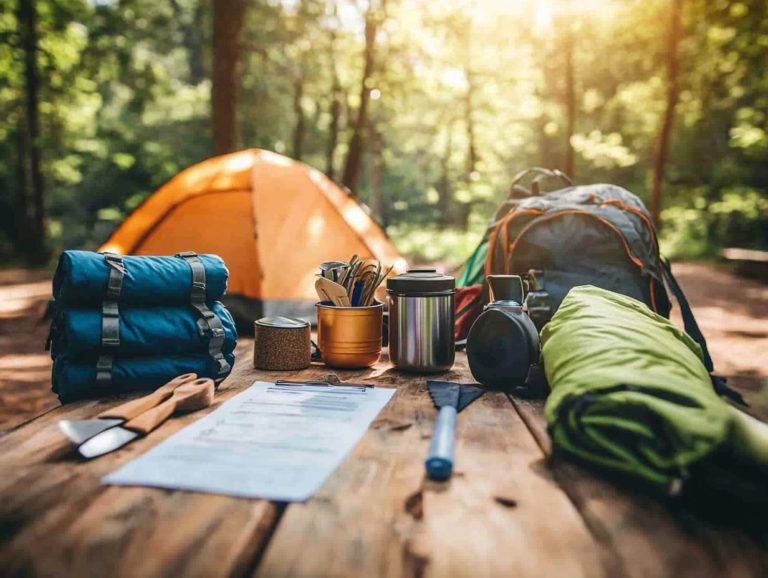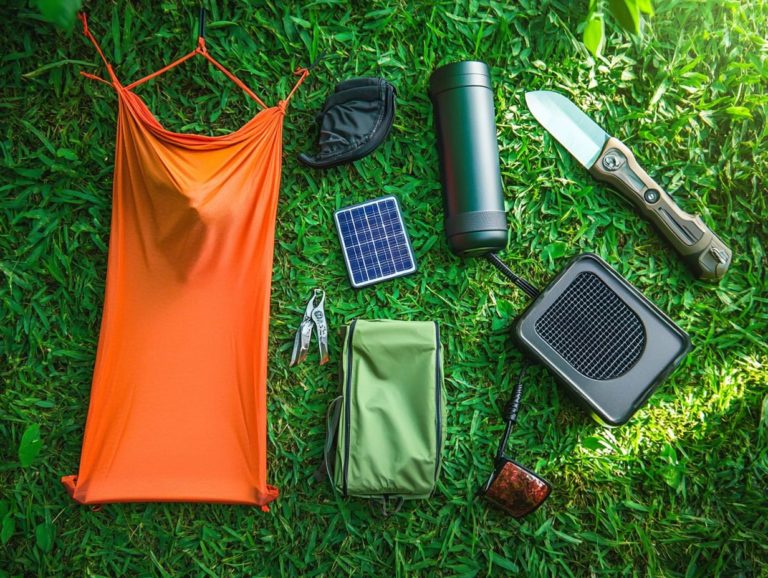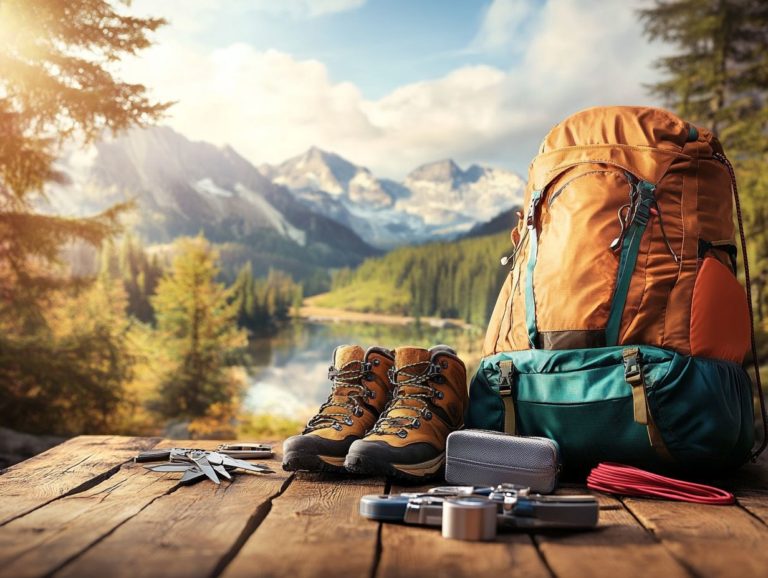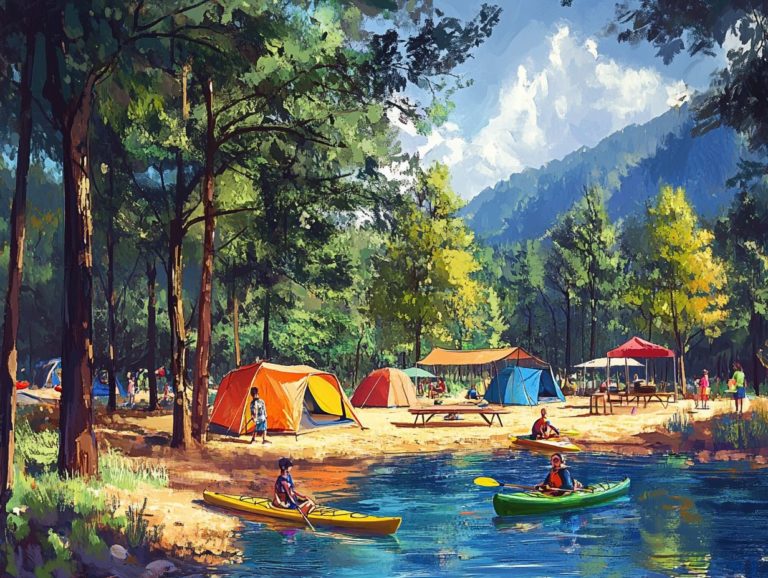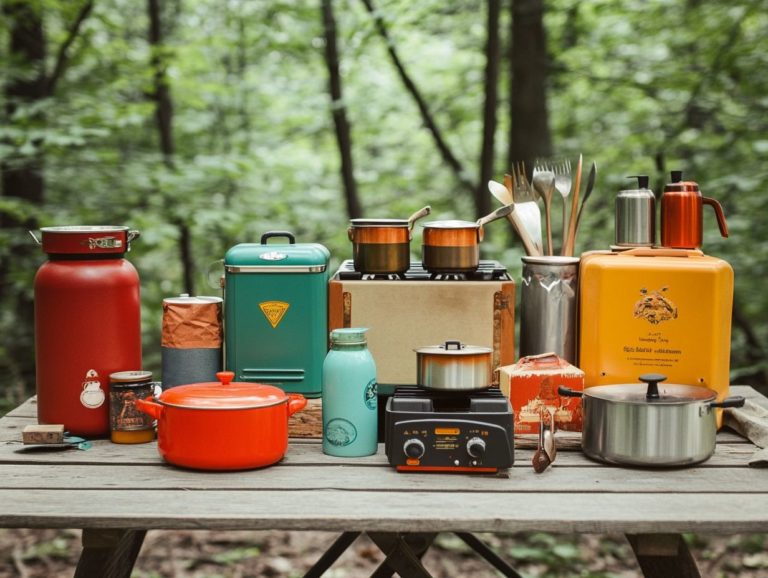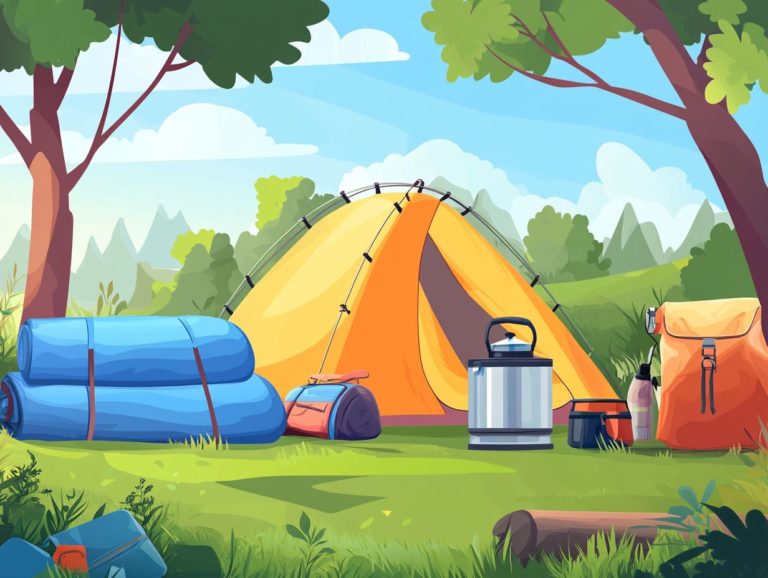How to Keep Food Fresh While Camping
When you find yourself in the wilderness, basking in the beauty of nature and the thrill of adventure, the last thing you want to fret over is food spoilage. Effective camping food storage is essential for keeping your meals fresh and safe.
Food preservation allows you to enjoy your culinary experience while keeping your provisions cold. Factors like temperature and humidity play a significant role in how long your food stays edible.
This guide covers the best practices for preserving your food, including effective storage techniques like using a high-quality cooler and selecting the right items for your trip. It also explores alternative methods, such as utilizing coolers and implementing emergency measures to tackle spoilage.
Whether you re a seasoned camper or stepping into the great outdoors for the first time, this information will help you savor delicious and safe meals throughout your adventure, including essential tips for proper sanitation.
Contents
- Key Takeaways:
- Factors that Affect Food Freshness
- Best Practices for Keeping Food Fresh While Camping
- Alternative Options for Keeping Food Fresh
- Emergency Measures for Food Spoilage
- Frequently Asked Questions
- How can I keep my food fresh while camping?
- Are there any specific types of foods that are easier to keep fresh while camping?
- How can I prevent my cooler from getting wet and causing my food to spoil?
- Can I freeze my food before I go camping to keep it fresh longer?
- What are some alternative methods for keeping food fresh while camping without a cooler?
- What should I do with leftover food while camping to prevent it from spoiling?
Key Takeaways:
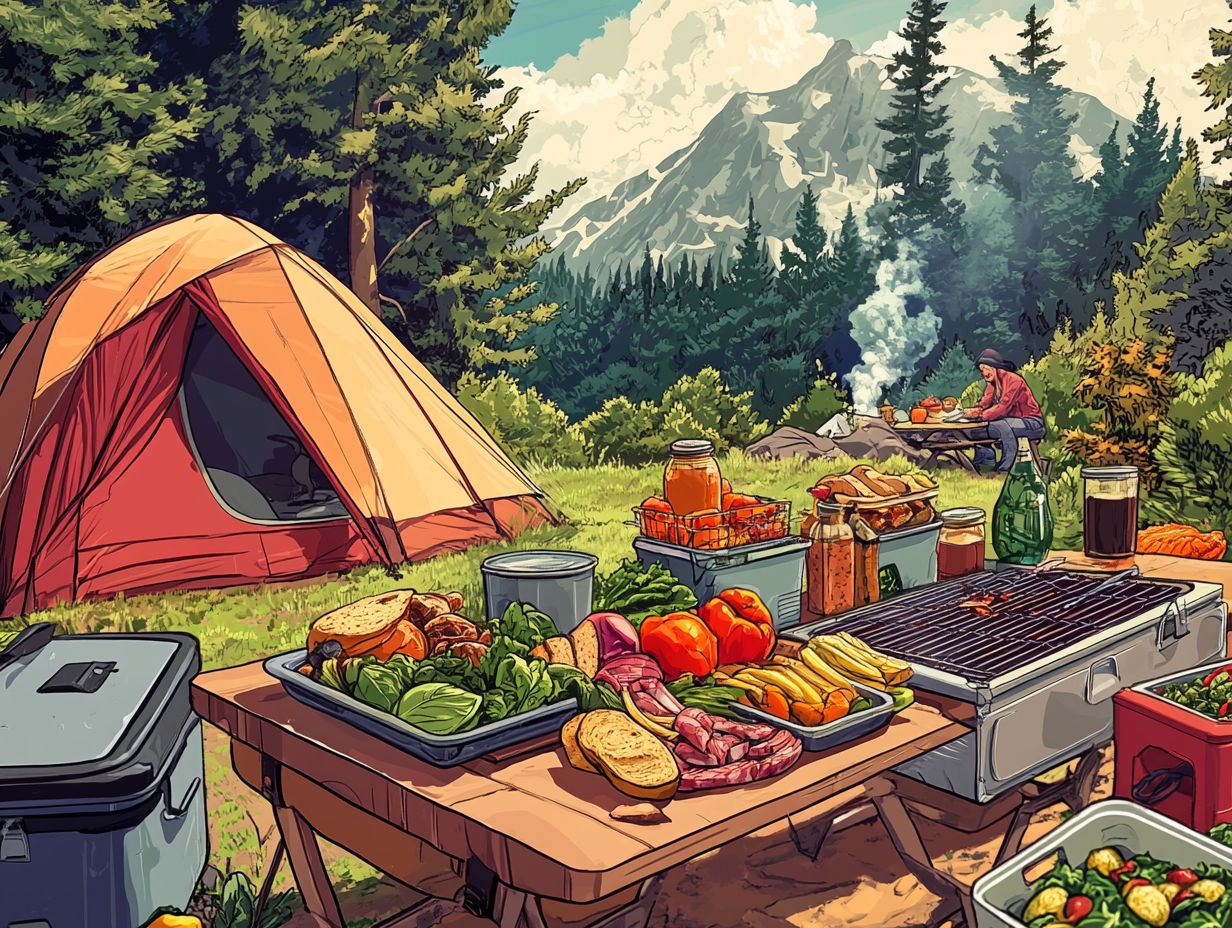
- Master food preservation to keep your meals safe and enjoyable, avoiding food spoilage and health risks.
- Recognize that temperature and humidity affect food freshness while camping.
- Utilize coolers and ice, such as the Yeti Tundra and Coleman X-Treme, along with methods like dehydrating foods and vacuum sealing (removing air from bags), to maintain food freshness.
Why is Food Preservation Important While Camping?
Food preservation is crucial during camping trips. It ensures your meals remain safe to eat and delicious by using strategies like bear-proof containers (designed to keep food safe from wildlife).
The importance of preserving food cannot be overstated. It plays a pivotal role in maintaining the flavor and freshness of your camping meals while safeguarding your health. As you immerse yourself in nature, understanding proper food storage techniques, such as efficiently organizing your cooler, becomes vital. Additionally, staying hydrated while camping is crucial, as poor food storage can lead to serious health issues.
Consider using hard-sided coolers filled with ice, vacuum-sealed bags, and well-insulated perishables as effective strategies to combat spoilage. Being aware of wildlife is equally crucial; using bear-proof containers and hanging your food at a secure height can deter curious animals. Striking a balance between food safety and enjoying your outdoor experience is key, especially when practicing wildlife awareness.
Savor your culinary delights while minimizing the risks of foodborne illnesses and wildlife encounters!
Factors that Affect Food Freshness
Understanding the factors that influence food freshness while camping, including the importance of proper sanitation, is crucial for ensuring your meals remain safe and delightful. Key elements such as temperature and humidity significantly affect the quality of perishable items. Invest in high-quality coolers like the Yeti Tundra, Coleman X-Treme, or a portable car fridge to maintain ideal conditions.
Environmental factors also play a role; exposure to sunlight and fluctuating temperatures should not be overlooked. Manage your food storage carefully by utilizing airtight containers and minimizing spoilage to enjoy your camping recipes without a hitch.
Temperature, Humidity, and Other Environmental Factors
Temperature and humidity are critical for food safety and freshness while camping. Smart planning, like organizing your cooler, is essential.
Understanding how these factors interact helps maintain food quality. Keeping perishables at or below 40 F is vital.
High humidity can cause condensation inside storage containers, leading to mold or spoilage. Use freezer-safe containers to combat this.
Consider packing silica gel packets or aluminum foil to absorb excess moisture. Vacuum-sealed bags for meat or meals maximize storage space and extend shelf life.
Thoughtful food storage ensures your meals stay safe and enjoyable throughout your camping adventure.
Best Practices for Keeping Food Fresh While Camping
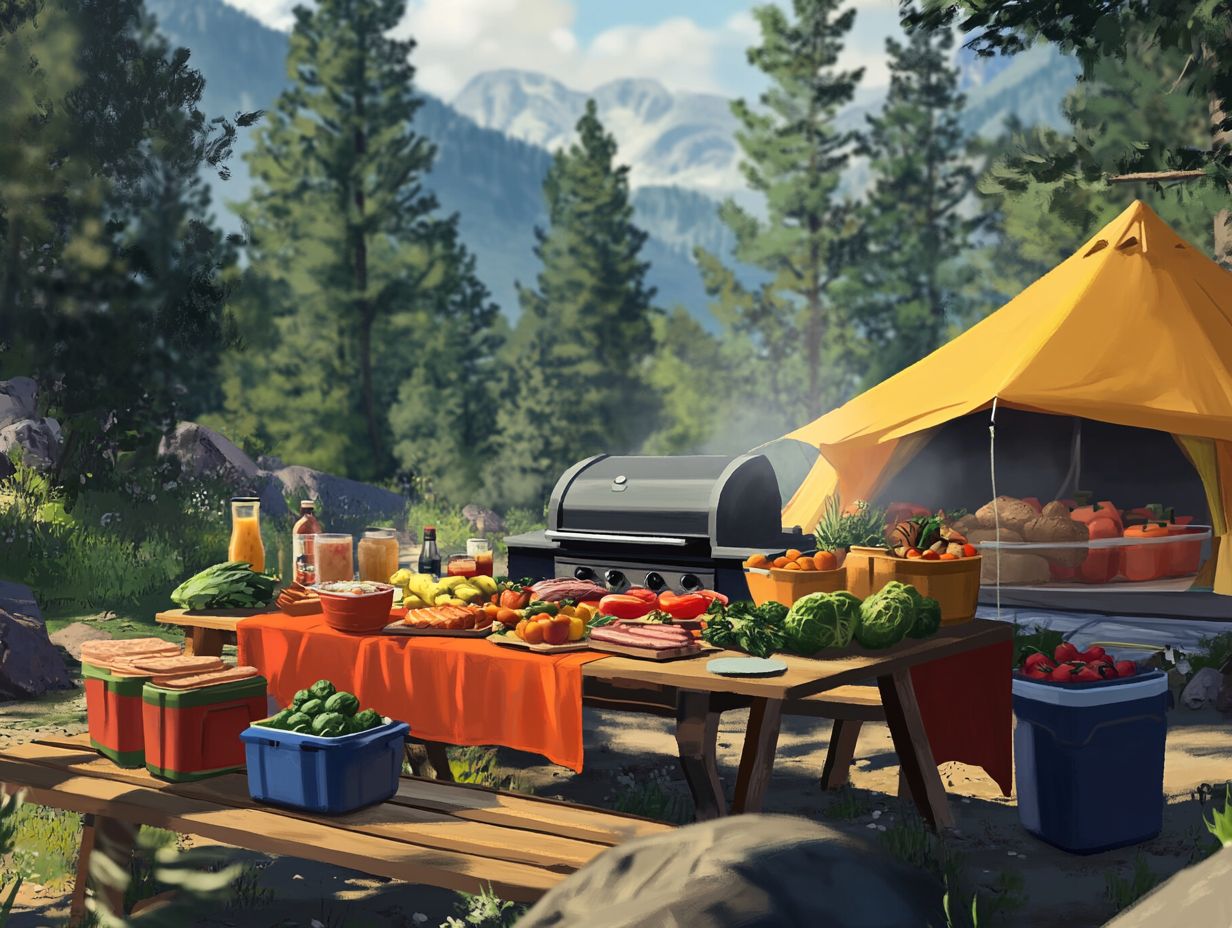
To keep food fresh while camping, adopt best practices for storage and packing. Planning meals ahead is key.
A well-organized cooler keeps food cold and safe. It also makes accessing perishable items easy when hunger strikes.
Incorporate emergency snacks and plan meals in advance. Choose options like instant meals or trail mix to reduce spoilage.
Investing in high-quality coolers, like Yeti or Coleman, enhances your outdoor experience. Pack snugly and minimize cooler openings.
Proper Storage and Packing Techniques
Using a separate cooler for drinks is important for food safety. This practice preserves freshness.
Utilize storage solutions like insulated backpacks, leak-proof bags, and airtight containers. Separating raw and cooked foods helps avoid cross-contamination.
Stacking methods maximize space and minimize movement on the road. Select compact cooking pots and collapsible bowls to keep your environment tidy.
Knowing how to use these tools effectively improves both health and enjoyment of your meals.
Choosing the Right Foods for Camping
Selecting the right foods can make or break your camping culinary adventure. Aim for convenience and nutrition with non-perishable foods.
Non-perishable options, like trail mix, offer delicious snacks with minimal prep. Instant meals provide quick cooking solutions.
These choices save space and reduce spoilage risk, perfect for longer trips. Include protein-rich items like canned beans or vacuum-sealed meats in your planning.
Packing hardy vegetables, like carrots or bell peppers, ensures balanced nutrition. Thoughtful meal planning, including water purification methods, satisfies diverse tastes.
Alternative Options for Keeping Food Fresh
Exploring alternative options for keeping food fresh during your camping adventures, such as using block ice or natural cooling methods, can unveil innovative solutions. This ensures your meals remain safe and delicious throughout your trip.
Beyond the usual coolers, consider methods like freeze packs, block ice, or even a portable car fridge to maintain optimal temperatures for your perishable items, maximizing ice retention capabilities.
Techniques like dehydrating foods or vacuum sealing meals will keep your food fresh for longer! Additionally, proper food safety practices can greatly reduce the risk of spoilage.
Using Coolers and Ice
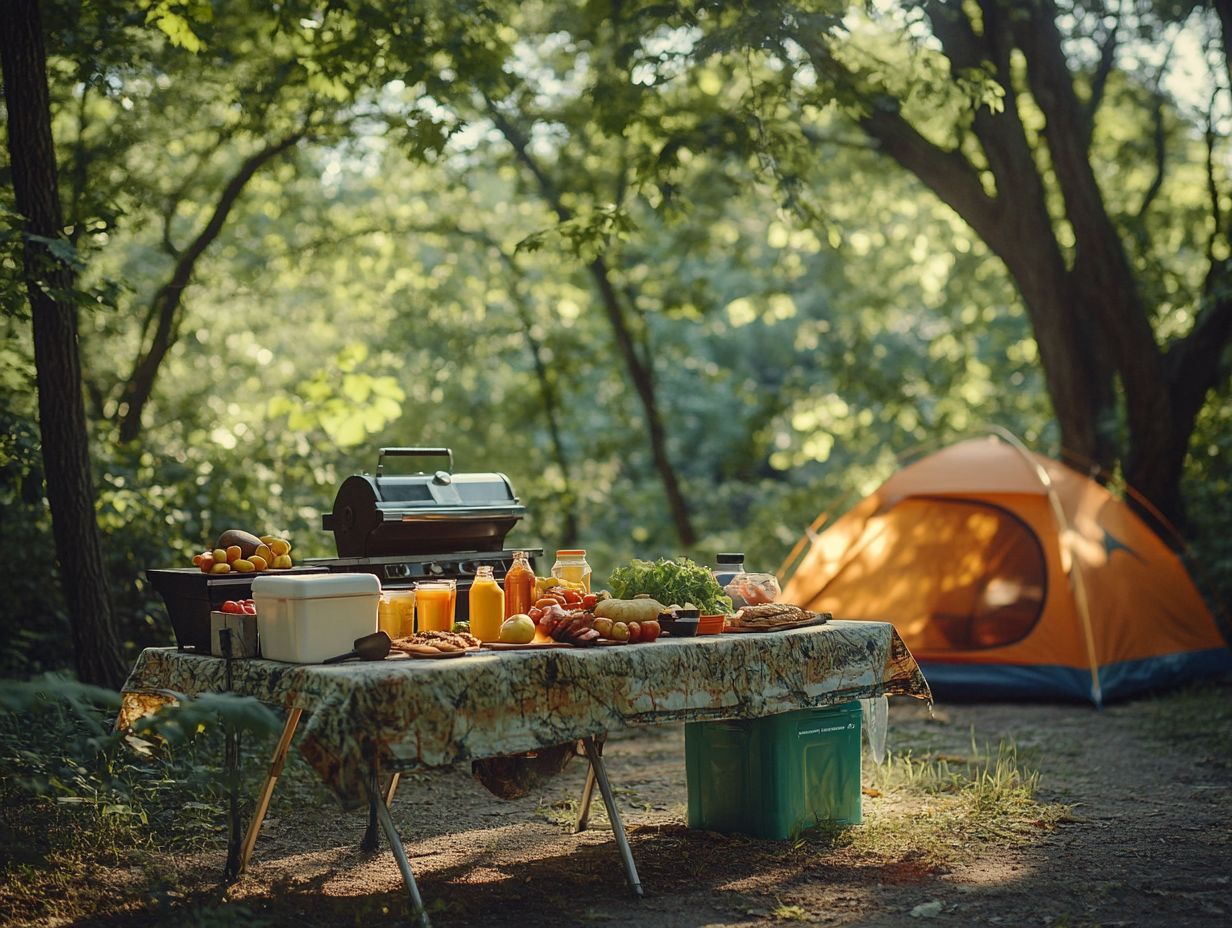
Using coolers and ice effectively is crucial for keeping your food fresh while camping. Your choice of equipment and packing methods is important.
For good coolers, options like the Yeti Tundra, Tundra 65, or Coleman X-Treme stand out for their exceptional ice retention capabilities. These let you keep your food cold for longer stretches.
Strategically placing freeze packs and frozen water bottles within your cooler can further optimize cooling efficiency. Keeping your cooler in the shade during the day will help too.
To enhance food preservation, plan your meals and pack wisely. Consider compartmentalizing your ingredients in airtight bags or using freezer-safe containers. This reduces air exposure and moisture, ensuring everything stays fresh.
When filling your cooler, layer items based on how often you ll access them. Use insulated walls as a barrier to maintain temperature. Keep frequently used items on top for easy reach, and stash denser, less-used items below.
Filling any empty spaces with extra ice or towels can help prevent air circulation, giving your ice a fighting chance to last longer.
Finally, choose shaded spots to set your cooler. Direct sunlight can drastically affect its temperature and lead to food spoilage.
Dehydrating and Vacuum Sealing Foods
Dehydrating and vacuum sealing foods are ingenious techniques that enhance your camping experience while ensuring long-lasting freshness. These methods are perfect for camping snacks and meal planning needs.
By removing moisture, dehydrated foods become lightweight and incredibly easy to pack. This makes them ideal for quick meal options, enhancing your overall culinary experience.
Vacuum sealing meals not only extends their shelf life but also preserves essential flavors and nutrients. This allows you to savor delicious camping recipes while minimizing the risk of food spoilage.
These processes play a pivotal role in food preservation, helping you minimize waste while maximizing enjoyment in the great outdoors. Dehydrated foods retain vital vitamins and minerals, ensuring nourishing meals with every bite.
The vacuum sealing process creates an airtight environment, effectively preventing oxidation and the growth of harmful bacteria an important safety step, especially in remote areas.
Together, these methods offer remarkable convenience: pre-prepared meals and snacks can be quickly rehydrated or cooked. This saves you valuable time and effort at the campsite, allowing you to focus on immersing yourself in nature s wonders.
Emergency Measures for Food Spoilage
Being prepared with emergency measures for food spoilage can elevate your camping experience. This shields you from potential disappointments and health risks tied to unsafe food.
By recognizing the signs of food spoilage and keeping a stash of emergency snacks or quick meals on hand, you ensure that you stay nourished, even if your primary food storage falters.
Familiarizing yourself with food safety practices and knowing how to properly discard spoiled items are essential steps to creating a safe and enjoyable camping environment.
Before your trip, prepare a meal plan or checklist to ensure you’re fully equipped.
What to Do if Food Spoils During Camping
If food spoils during your camping adventure, it s crucial to respond swiftly. This helps safeguard both your well-being and the enjoyment of the great outdoors.
Start by assessing the situation and pinpointing any foods that spoil easily. Handle these items with care to ensure proper sanitation and prevent contamination.
Keeping a stash of emergency snacks handy can be a lifesaver! They offer a quick fuel boost while you figure out your next meal plan.
Examine your food items for any off smells, strange textures, or color changes that might indicate spoilage, especially in meats, dairy, and cooked foods.
Once you’ve identified the culprits, dispose of them properly. Seal them in airtight bags to minimize odors and deter curious wildlife from invading your campsite.
Always find a suitable disposal area ideally at least 200 feet away from your camping spot and water sources. This helps maintain hygiene.
Regularly cleaning your cooking and eating utensils can further reduce the risks of cross-contamination. This means preventing bacteria from spreading between items, ensuring that your remaining food stays safe to eat.
Don t forget to store all food items in coolers with ice packs. You may also want to invest in premium insulated bags for perishables. Keeping them out of direct sunlight extends their freshness.
Frequently Asked Questions
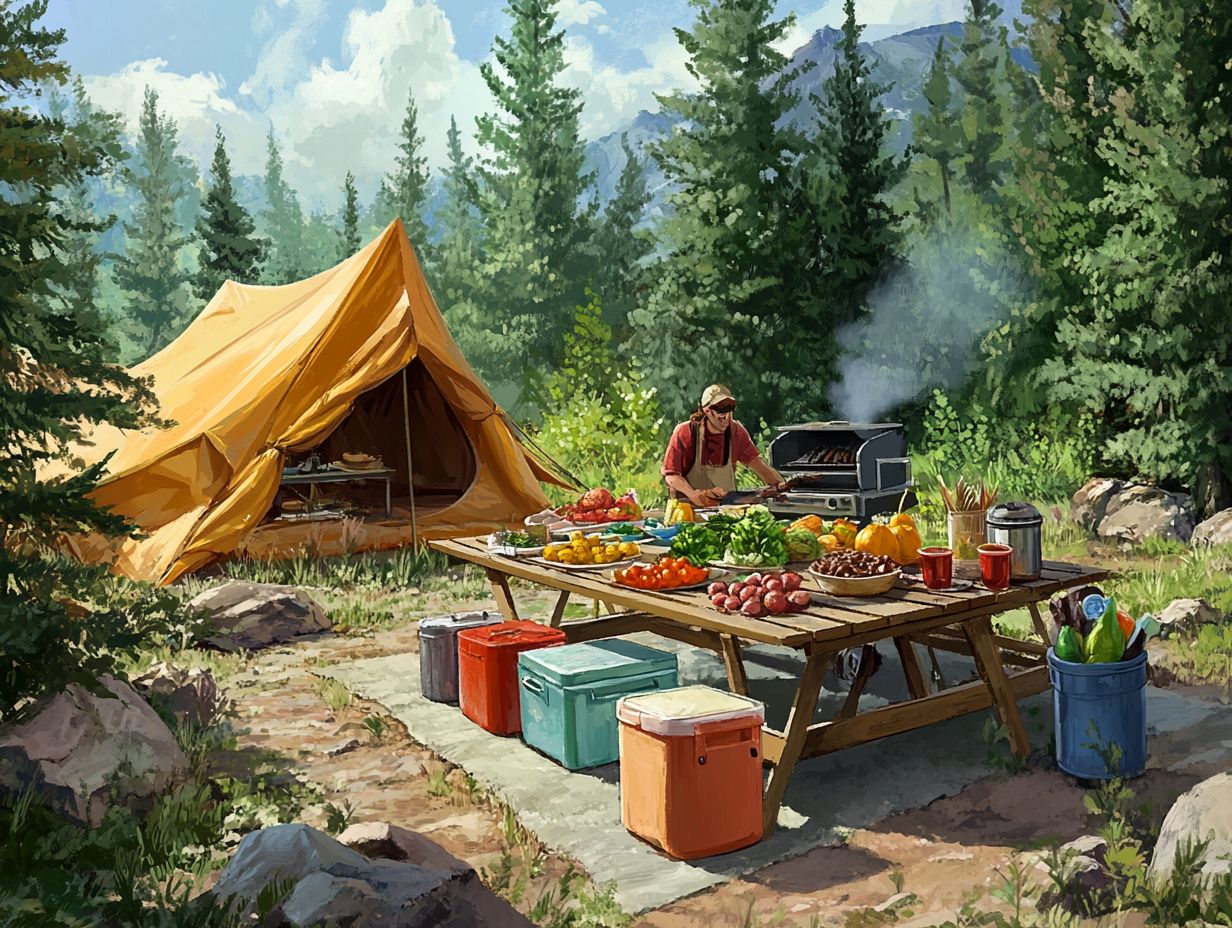
Here are some essential tips for camping food safety and organization.
How can I keep my food fresh while camping?
One way to keep food fresh while camping is to use a cooler filled with ice or frozen water bottles. Make sure to keep the cooler in a shaded area and replenish the ice as needed!
Are there any specific types of foods that are easier to keep fresh while camping?
Foods that are less likely to spoil, like canned goods and dry items, are typically easier to keep fresh. Avoid bringing dairy products or meat that requires constant refrigeration.
Utilize airtight containers for optimal food storage.
How can I prevent my cooler from getting wet and causing my food to spoil?
To prevent your cooler from getting wet, place a layer of towels or newspaper at the bottom. This absorbs melted ice. You can also use a separate cooler to hold beverages, minimizing openings.
Can I freeze my food before I go camping to keep it fresh longer?
Yes! You can freeze certain foods before going camping to keep them fresh longer. This is especially useful for items like meat or pre-made meals that you won’t use immediately.
Just be sure to pack the frozen items at the bottom of the cooler along with freeze packs to maintain a consistent temperature.
What are some alternative methods for keeping food fresh while camping without a cooler?
If you don’t have a cooler, use airtight containers for dry goods. Wrap perishable items in layers of aluminum foil and store them in a shaded area.
Another option is to bring non-perishable foods that don’t need refrigeration, like trail mix or instant meals.
What should I do with leftover food while camping to prevent it from spoiling?
To keep leftover food safe, store it in a sealed container or bag and place it in a cooler with ice. If you can’t keep the leftovers cold, it’s best to toss them out. Don t risk it! Properly storing your food helps you enjoy your trip worry-free. Consider using a container that can go in the freezer for added safety.

